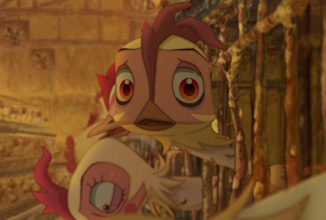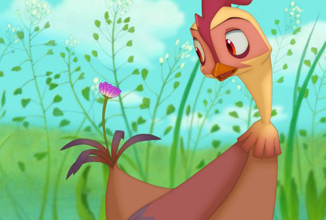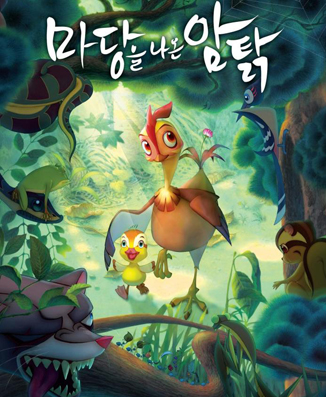Synopsis:
Leafie is a hen who has lived her life as a virtual prisoner, laying eggs day-in-day-out in a cramped, dark and dank farm building. Desperate to see the outside world, find love and (hopefully) eventually become a mother, she risks life and limb to escape ‘into the wild’. However, no sooner has she left the chicken coup behind than a tragic event leaves her incubating a duck egg that, before long, hatches into a baby mallard, and, with the help (or more accurately, the constant interruptions) of an overtly aggressive otter, she begins her journey to teach her new ‘son’ about life, at the same time as learning about her own…
Review:
In the early stages of the Leafie: A Hen into the Wild, as our heroine's desire (and need) to escape the 'prison' of the chicken coup and live the life she feels she should be living pushes her into action - kick-starting her arduous journey - viewers (certainly in the West, at least) may be tempted to draw comparisons to fairly recent, well known English language animations detailing farmyard animal escape stories, but no sooner than Leafie's hopes, dreams, trials and tribulations "in the wild" begin to take centre stage, all thoughts of similarities will be summarily dismissed.
For what we have here is almost Korean Cinema in a nutshell (or egg shell, if you prefer) - a genre-bending, multi-themed work, the surface simplicity of which belies a much greater underlying depth.
Romantic yearning; unrequited love; the search by an outsider for acceptance and a place within society; the importance of family, familial bonds and family values to both an individual and society as a whole; a mother's ultimate contentment from placing the needs and happiness of loved ones above those of her own; and the worthiness of being willing to make whatever sacrifices are necessary to ensure an offspring's safety, well-being and success - they're all here, deftly wrapped up in a genuinely warm, gently funny and ultimately poignant narrative.
In fact, the only majorly familiar elements of Korean cinema that are (wisely) missing from Leafie are those of ultra-violence and revenge, their absence allowing the film to easily be, and to remain, as warm and uplifting as it is tear-jerking.
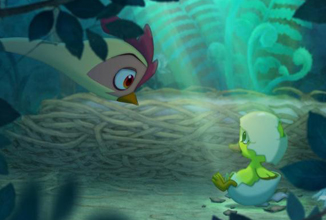 |
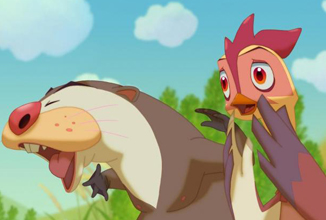 |
And talking of tear-jerking, while the fact that the film has a sad and soulful conclusion will likely come as no surprise to anyone who has watched even a little Korean cinema, the ending of Leafie: A Hen into the Wild is nonetheless beautifully and gently stated - thankfully, free of overt or forced melodramatics - thereby ensuring a heartfelt believability to Leafie's touching story that almost guarantees viewers will be genuinely moved, while still able to leave the cinema with warm, contented smiles on their faces.
Quite an achievement for an animated story about a chicken.
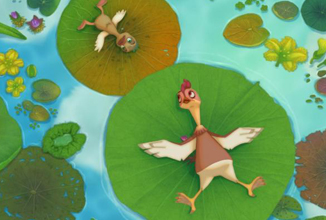 |
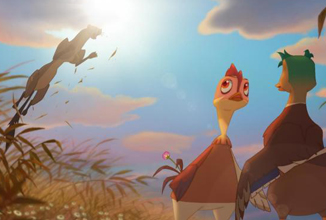 |
Leafie: A Hen into the Wild is based on a popular Korean children's story, and while that fact alone would have undoubtedly resulted in the film appealing to the young, eye-catching and sumptuous visuals within a sweet, funny and easily understood narrative, combined with quirky, eccentric and likable (even lovable) characters serve to cement that attraction even more firmly in place.
However, Leafie is far more than simply that, for those who choose to look, with the myriad of underlying themes, gorgeous artwork and near perfect cast voice performances (laced with superbly nuanced emotion throughout) all adding up to Leafie: A Hen into the Wild being a feast for the eyes, ears and hearts of adults and children alike.
Cinematically, Leafie is utterly stunning and has a distinctly old-school feel to the animation, especially in the luscious vistas and scenery present. Director Oh Seong-yun has a background in fine arts and that experience is clearly on show (repeatedly) in almost every sumptuous frame, to the extent that background scenes could just as easily have been painted artwork, framed and hung, pride of place, on a central wall.
The film's pace can't be faulted either, being deftly driven throughout by narrative events (large or small, funny, thrilling or gentle) - feeling totally natural as it subtly slows and quickens as required, but never dragging nor rushing in any way, shape or form.
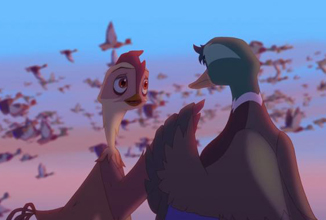 |
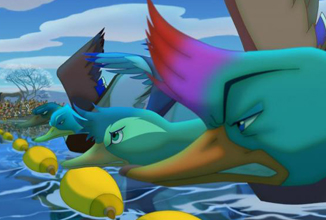 |
The final element on which the success of Leafie relies is, of course, the cast voice performances. Leafie has an incredibly high calibre of acting talent present in all of the main character roles (Moon So-ri and Choi Min-sik to name but two) and the decision to use some of Korea's top acting stars pays dividends from the very first moment to the very last. All of the cast vocal portrayals are perfectly nuanced, each bursting with realism, believable humour and emotion. In fact, it's hard to imagine how they could be bettered, in any respect, and I'd even go as far as saying that they are so good they almost make you forget that you're listening to overdubbed vocals at all.
Director Oh Seong-yun has said that Moon So-ri initially turned down the role of Leafie, only subsequently accepting the part after reading the script. I, for one, am deeply glad she changed her mind.
Main Cast: Moon So-ri, Choi Min-sik, Yoo Seung-ho, Park Cheol-min, Kim Sang-hyeon, Jeon Sook-kyeong
Directed by: Oh Seong-yun
Summary:
Disney once asked viewers to believe that an elephant can fly. With Leafie: A Hen into the Wild, you'll believe that a hen has a heart, and a beautiful one at that.
This review of Leafie: A Hen into the Wild comes following a screening of the film at the London Korean Film Festival 2011.
I'd sincerely like to thank everyone involved in the organisation of the festival for allowing me to see this film, as well as many others throughout the LKFF.
|


